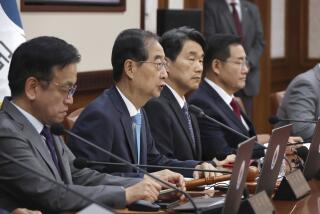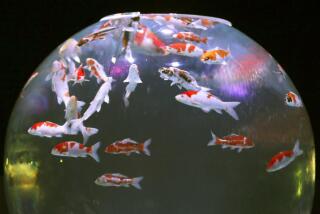Japan, Seoul Find Giving Rice to Pyongyang Isn’t Easy : Asia: S. Korea protests having to fly N. Korean flag on ship. Despite rhetoric, some see chance for improved relations.
- Share via
TOKYO — Japan and South Korea are discovering that when dealing with Communist North Korea, even giving gifts can be difficult.
As Japan on Friday completed seven difficult days of negotiations to send 300,000 tons of rice--half of it free--to North Korea, South Korea halted its deliveries of rice aid after North Korea forced a South Korean ship to raise the flag of the North in a northern port.
South Korean Unification Minister Rha Woong Bae demanded an apology, ordered two more ships en route to the North to turn back, and threatened to call off shipment of the rest of 150,000 tons of free rice.
Late Friday, North Korea sent a formal letter of apology saying it would not happen again, South Korean officials said, adding that it appeared to be enough for South Korea to restart the rice shipments.
Earlier in the day, the Sea Apex, a South Korean ship, unloaded 2,000 tons of rice at the northern port of Chongjin but was forced to hoist the North Korean flag. Under a landmark deal signed last week in Beijing, the two Korean governments agreed that no flags would be hoisted on the southern ships.
North Korea, which prides itself on following a policy of juche , or self-reliance, has not informed its people that it is receiving aid.
“Forcing our ship to raise the North Korean flag was a serious violation of our agreement,” Rha said.
Meanwhile, in Tokyo, North Korea finally signed an agreement Friday to accept 300,000 tons of rice from Japan in a deal that the Japanese hoped would open the door to talks to establish diplomatic relations between the two countries.
*
Foreign Minister Yohei Kono acknowledged that the agreement contradicted Japanese policy of not giving North Korea any economic aid until diplomatic ties are established.
But he said Japan had decided to make a special exception as a humanitarian gesture and as a reward to North Korea for taking “a first step toward . . . participation in the international community.”
“North Korea frankly admitted its food shortage for the first time . . . [and] turning down North Korea’s request might have a negative impact on the peace and stability of Northeast Asia,” Kono said.
He also said he hoped the shipments “will help foster a better environment for the negotiations [for the normalization of relations] between Japan and North Korea.” A delegation of the Liberal Democratic Party, which Kono heads, visited Pyongyang in March and agreed to reopen the negotiations, but there has been no progress toward renewing the talks.
Japan, which annexed Korea as a colony between 1910 and 1945, has maintained diplomatic relations only with South Korea since 1965.
Kono said he hoped that the North-South flare-up over the Sea Apex would be resolved. Initial shipments from Japan were expected to start only after South Korean shipments are resumed. North Korea first asked Japan for rice aid in May, but Japan said it could help only after the North showed that it was willing to accept assistance from South Korea too.
*
Accepting the rice did not stop North Korea from subjecting South Korea and Japan to continuing denunciations. In the midst of the negotiations here, North Korea charged that Japan, in enacting a parliamentary resolution on World War II, was trying to conceal its “war crimes” and declared that “the international community will never trust Japan.”
The rice from Japan will be taken from rice imported from Thailand and China in late 1993 and 1994 when Japan suffered a shortage because of cold weather. Excessive imports and the Japanese people’s distaste for imported rice, especially from Thailand, left a surplus.
Japan agreed to give North Korea a 30-year, low-interest loan of $56.5 million to finance the purchase of 150,000 tons of the rice, with payments deferred for the first 10 years.
More to Read
Sign up for Essential California
The most important California stories and recommendations in your inbox every morning.
You may occasionally receive promotional content from the Los Angeles Times.













